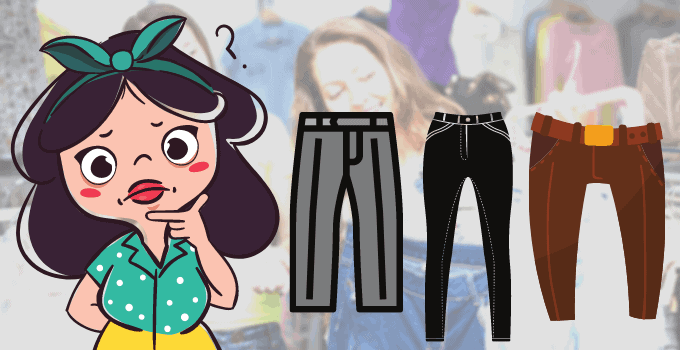And today’s topic is… pants! Wait, no, I mean the topic is trousers. Or is it slacks?
Actually, we’re going to take a look at all three of these near-synonyms and figure out what, if anything, is the difference between slacks, pants, and trousers.
Difference between Pants, Trousers, and Slacks
Pants: the Long and the Short of It
The Origin of Pants
Trousers VS Pants
The Etymology of Trousers
Slacks: Loosely Speaking, They’re Pants
The Etymology of Slacks
Bonus Pants, Verb Version
Bonus Pants, British Version
What’s the difference between pants, trousers and slacks?
The difference between slacks, pants, and trousers is that in the US, pants cover waist to ankles; in the UK, pants mean underwear. Trousers in British English are equivalent to pants in American English, referring to leg-covering clothing. Slacks are loosely cut pants often worn semi-formally.
Pants: the long and the short of it
As described above, in American English, “pants” refers to the type of clothing that has two legs covering you from your waist to your ankles.
When used in this way, pants can refer to any kind of pants. Jeans are pants, and so are chinos and khakis and suit pants.
In fact, even slacks are pants. (If you want to get technical, trousers are also pants, but we’ll get to that later.)
In British English, however, the word “pants” carries a very different meaning.
If you ask an English friend if they like your pants, you’re likely to get a very strange look as a response.
That’s because in British English the word “pants” refers to underpants rather than the type of outwear this word refers to in American English.
Examples
“The pants that go with my new suit already have a hole in them.”
“I bought a really comfortable pair of khaki pants yesterday.”
In these examples, we are clearly in an American setting.
Suits don’t typically come with matching undergarments, and khaki would be a very unusual (and probably uncomfortable) material for underwear as well.
“I laughed so hard I nearly peed in my pants.”
Although this could be American English as well, it works equally well in British English.
“My mum always made me pack five changes of pants no matter how short a trip we were taking, which was very embarrassing when airport security dumped my suitcase out in front of everyone.”
Here, there’s nothing embarrassing about American-style pants, so the speaker is probably referring to undergarments.
The origin of pants
No matter its meaning, the word “pants” has an interesting history. Technically, this is called its “etymology,” or word origin.
“Pants” came to English from French and Italian in the late 1500s via the words “pantalon” (French) and “pantalone” (Italian).
The French word actually refers to a stock character named Pantaloon, essentially a clown-like buffoon who wore a pair of tight pants as part of his costume.
In Italian, the word “pantalone” also refers to a stock character named Pantaloon, although in this case, the character was not as clown-like.
Trousers VS pants
Now that we’ve defined pants, how are trousers different?
In most, if not all, cases, the word “trousers” is actually completely identical to the word “pants” except for being British English instead of American English.
Some people will use the word “trousers” in American English to refer to pants, but this is typically only done if they are trying to appear intellectual or professorial or in a very formal outfit.
Additionally, some style guides will define trousers as a specific type of pants or use the way the piece of clothing is cut to distinguish between the two.
While both trousers and pants fit the definition used for “pants” above, the argument here is that trousers are actually created by sewing together one piece of fabric for each leg.
Pants, on the other hand, is a more general term and may be created from a single piece of cloth.
Again, though, this use of “trousers” are non-standard. Unless you’re studying to become a tailor or fashion expert, all you really need to remember is that American = pants and British = trousers.
Examples
“When I went to England, I had to remember to ask for trousers instead of pants in the clothing store.”
“The trousers my cousin wore to London for his job interview were very posh.”
In both these contexts, we are pretty clearly using British English.
Note that when using trousers, just like with pants, you need to treat the noun as a plural. That means were and are, compared to was and is.
The etymology of trousers
The origin of trousers is a little unclear, but it’s equally as fascinating as that of pants.
Although “trousers” is a bit more modern, it has its origin in the word “trouse” that has been in existence since roughly the 1500s. Unlike “pants,” this word comes to English from Irish and Gaelic.
In these Celtic languages, the word “triubhas” referred to a specific type of garment that was tight-fitting and covered both legs to the ankles.
“Trouse” is also why some people refer to “trousers” as pants which have a separate piece of fabric for each leg.
The Oxford English Dictionary notes that the “trouse” was “divided below [the buttocks] to form a separate covering for each thigh.”
Although “trouse” is now an obscure historical term, “trousers” lives in and has been the more common use in English since the early 1600s.

Slacks: loosely speaking, they’re pants
Our third word is both less and more complicated than the difference between pants and trousers.
The word “slacks” refers to a specific type of pants (or, in the UK, a specific type of trousers).
What type is a matter of some debate.
Some style guides suggest that slacks are only formal pants, while others say that slacks are completely different from the type of pants that come with a suit or other formal wear.
Going back to the Oxford English Dictionary to resolve the debate, we learn that slacks are “loosely-cut trousers for informal wear.”
This makes sense if you think about it, because “slack” is another word for “loose,” and you wouldn’t want loose pants in a formal setting.
While the dictionary claims slacks are mostly for women, this particular distinction has largely disappeared, and today,you will find slacks in the men’s section of clothing stores as well.
That said because there is so much confusion over what “slacks” means, your best bet is to confirm the intended meaning if you’re in a situation where wearing the wrong kind of pants might get you in trouble.
If, for instance, you have RSVP’d to a party that says to wear “a white tie and slacks,” you should check to make sure you’re wearing appropriate clothing.
Interestingly, in some older books and newspapers, you might see “slacks” used in another way.
That’s because this word used to refer to the seat of your pants, presumably because sitting down multiple times stresses the fabric here and can make it loose or slack.
This is an archaic word, however, and “slacks” has not been used to refer to this since the late 1800s.
In most cases, or if you’re just trying to resolve an argument over the meaning of “slacks,” you can point to the definition of “slacks” as loose-fitting, generally informal trousers (or pants).
The etymology of slacks
Slacks, interestingly, have the oldest history of all these pants-related words.
That’s not because slacks, which have only been around since the 1800s, have a longer history, but rather because they come from the adjective or adverb “slack,” meaning loose.
This word comes to English from Germanic, the very early proto-language from which Old English, Dutch, German, Norse, and a variety of other languages.
Scholars think that this word came into Germanic from the Latin word “laxus,” also meaning loose.
In other words, “slacks” is arguably the most English word of all three options.
At least, it’s the one that has existed longest, with the use of slack as an adjective dating all the way back to the late 800s.
Bonus pants, verb version
One interesting thing about the word “pants” is that in both American and British English, you can use it as a verb as well as a noun.
If you see someone say to “pants” someone, it means to pull down their pants (or trousers).
While this is not a very polite thing to do, it is a good example of how language can change over time, with a word that initially referred to a piece of clothing changing to mean an action relating to it.
Bonus pants, British version
The word “pants” also has an additional unusual usage in British English. Here, the word stands in as slang for silly, useless or a waste of time.
For example, if you see a movie that is so bad it’s not even funny, you might turn to your British friend and say, “This movie is absolute pants.”
As a nice bonus, the word “pants” doesn’t carry the ableist connotation that many other similar words (dumb, lame, crazy) do.
It seems like pants are a really odd thing to use to talk down about something, but remember that in British English, the word refers to underwear.
According to language expert Michael Quinion, it’s the underwear connection that gives this meaning of “pants” its origin.
An older generation used the word “knickers” (another word for underpants) as a mild swear word, which morphed to pants in the 1990s.
It’s worth noting this slang is from the 1990s, so kids today probably don’t use it. Indeed, if you describe something as “pants” in this way, people will probably think you’re trying to be posh or that you’re very out of date.
Although that’s yet another example of changing language, it’s also complete pants, really, because this is an amusing turn of phrase that deserves a more permanent place in the way we speak.

Hey fellow Linguaholics! It’s me, Marcel. I am the proud owner of linguaholic.com. Languages have always been my passion and I have studied Linguistics, Computational Linguistics and Sinology at the University of Zurich. It is my utmost pleasure to share with all of you guys what I know about languages and linguistics in general.

